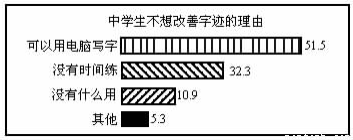题目内容
Facts About Goal Setting
These practical tips on goal setting can help make it easier to set and reach goals:
Specific, realistic goals work best. __1._____ "I'm going to recycle all my plastic bottles, soda cans, and magazines" is a much more doable goal than "I'm going to do more for the environment." And that makes it easier to stick with.
_____2._____ It will probably take a couple of months before any changes — like getting up half an hour early to exercise — become a routine part of your life. That's because your brain needs time to get used to the idea that this new thing you're doing is part of your regular routine.
____3.______ Say your goal out loud each morning to remind yourself of what you want and what you're working for. Writing it down works too. Every time you remind yourself of your goal, you're training your brain to make it happen.
____4._______ The key to making any change is to find the desire within yourself — you have to do it because you want it, not because a girlfriend, boyfriend, coach, parent, or someone else wants you to. It will be harder to stay on track and motivated if you're doing something out of obligation to another person.
Roadblocks don't mean failure. Slip-ups are actually part of the learning process as you retrain your brain into a new way of thinking. It may take a few tries to reach a goal. But that's OK — it's normal to mess up or give up a few times when trying to make a change. So remember that everyone slips up and don't beat yourself up about it. ___5.___
A. Repeating a goal makes it stick.
B. Pleasing other people doesn't work.
C. You should make a change in your life.
D. Just remind yourself to get back on track.
E. Set a goal and come up with steps to reach it.
F. It takes time for a change to become an established habit.
G. When it comes to making a change, the people who succeed are those who set proper goals.
1.G
2.F
3.A
4.B
5.D
【解析】
试题分析:这篇文章讲述了实现目标的五要素,掌握它们会帮助你更轻松容易的达到你的目标。
1.】根据下文的举例“我将要回收我的饮料瓶、易拉罐、和杂志”,“这比我将要为环境做贡献”这种目标更容易坚持。因此当面临一个变化,成功者常常制定具体的容易实现的目标。故选G。
2.根据下文:在做任何改变之前这将会花费将近一两月的时间,比如每天早晨早起一个小时去锻炼,并让它变成你生活中的惯例。因此要去改变一个已经建立起的习惯是要花很长时间最恰当。故选F。
3.根据下文:每天早晨大声说出你的目标并且提醒自己什么是你想要的,你工作是为了什么(写下来也有用)每次你用目标来提醒自己,你对大脑的训练才会管用。这一段在讲要不停的重复一个目标并且坚持。故选A。
4.根据下文:关键在于做出任何改变是要发掘你自己内在的欲望,你不得不去做这件事是因为你想要,不是因为你的女朋友,男朋友,教练,父母或者某个人让你去这样做。这一段在说求助于他人无效。故选B。
5.最后一段主要讲遇到障碍并不意味着失败。错误往往是学习过程中的一部分,所以要记住每次犯的错误,不要以此打击自己,只需要记住:要回到原来的道路上。选D。
考点:心理健康类文章

 全优测试卷系列答案
全优测试卷系列答案 冲刺100分1号卷系列答案
冲刺100分1号卷系列答案